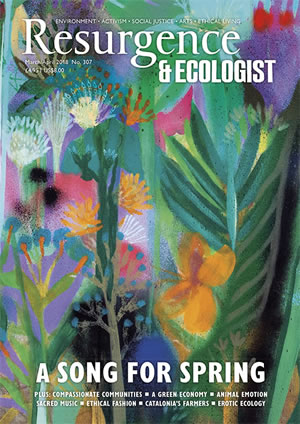Since Resurgence was launched more than half a century ago, we have established a tradition of putting forward positive solutions to the challenges facing our planet, society and the human spirit. Of course, from our earliest issues, published during the dark days of the Cold War, we have not shied from reporting threats to peace or the environment, the dangers of political and economic inequality, and the mounting alienation, isolation and despair created by society where power is centralised and enjoyed by a few, and where success is measured by wealth and excessive materialism. But the essence of Resurgence is to proclaim that we can meet these challenges. There is a better way.
That is why it is always a pleasure to publish news that shows the effectiveness of the principles we advocate. In our news pages, and in our Undercurrents section, we report in this issue on the success of a compassionate community scheme in Frome, a small English town that has succeeded in cutting hospital emergency admission rates by focusing on the issues of loneliness and isolation among its citizens. Doctors who recognised the limits of only treating symptoms have helped address causes, setting up projects where people whose isolation might easily have led to worsening health are being helped in numerous small ways that show the value of human empathy and cooperation rather than belated medical intervention. At a time when – not just in Britain – health services are facing increasing pressure, and the cost of high-tech medicine is spiralling, such initiatives show the value of a different, more local and more socially conscious alternative.
The achievements of such projects show that holistic, imaginative policies that put people and planet before economic nostrums based on infinite growth can succeed. David Orr, in a wide-ranging Keynotes essay, outlines what a sustainable economics could look like, and his arguments are echoed by our own Satish Kumar in his Choices column.
Elsewhere in this issue, the Resurgence spirit is strong. Andreas Weber’s essay on erotic ecology – so appropriate for spring – hymns the sensual side of our relationship with the natural world. Kate Blincoe reflects this theme with a thrilling reminder of one of the most evocative of seasonal sounds: the song of the skylark. And Philip Lymbery of the group Compassion in World Farming suggests that, increasingly, we are realising the dangers of an industrial, profit-at-all-cost approach to our food production.
Of course, there are other stories to tell. Our Ecologist section report from Ecuador, for example, shows how an ambitious attempt to legislate a place for Nature in a country’s constitution has encountered political problems. As ever, we ask for your support for nonviolent campaigners suffering persecution for their work. But there are encouraging signs, to match the season.
Before you turn the page, and begin – we hope – to enjoy this issue, a word of thanks to all those readers and other supporters who have enabled our fundraising campaign reach its target to help establish a new home for this magazine in a centre for education, environment, social justice and the arts. Perhaps it is another sign that the message of Resurgence, as vital as ever, is getting through. In troubled times, there is hope. There is an alternative.








